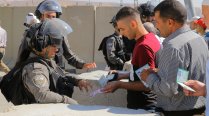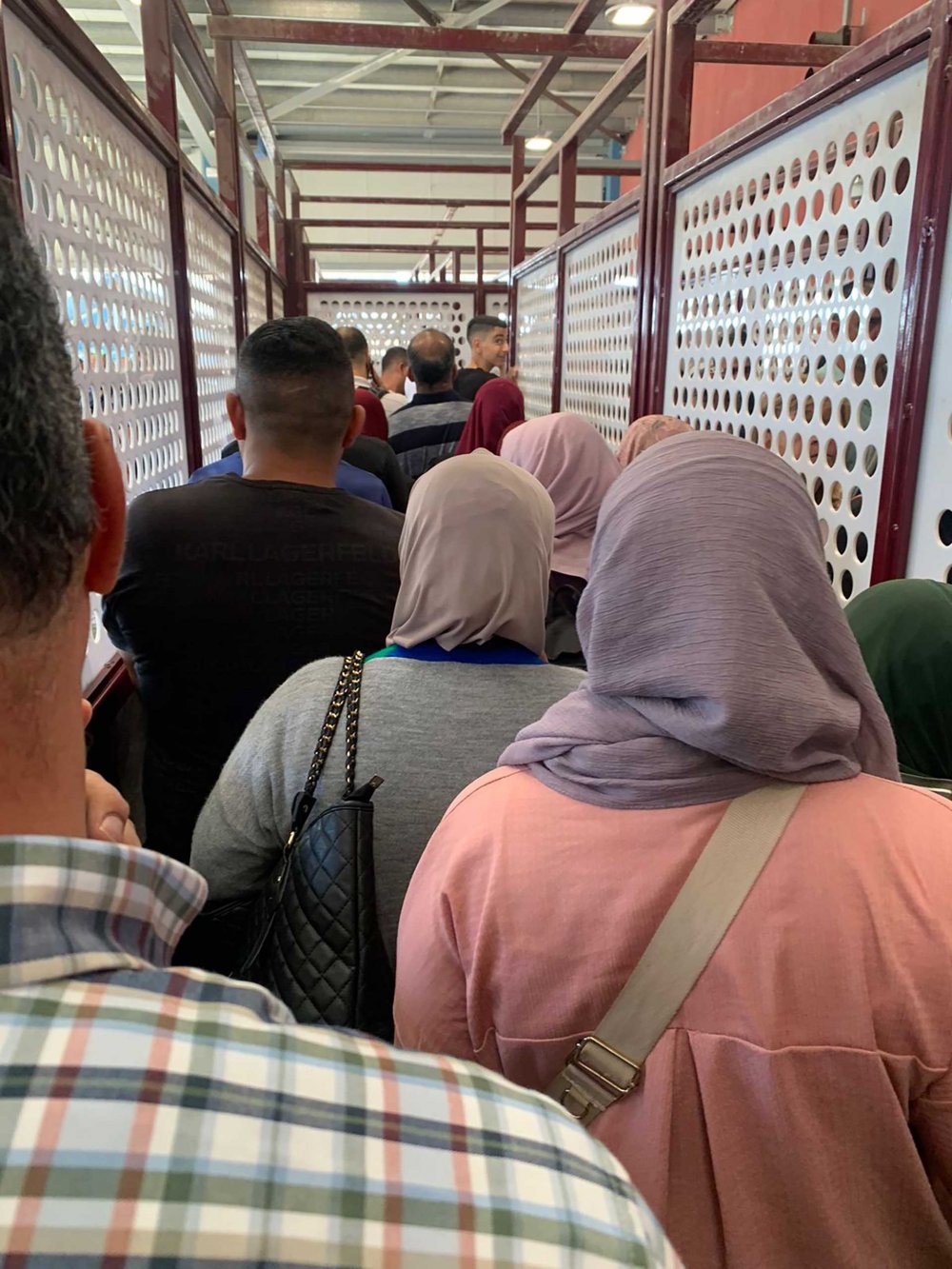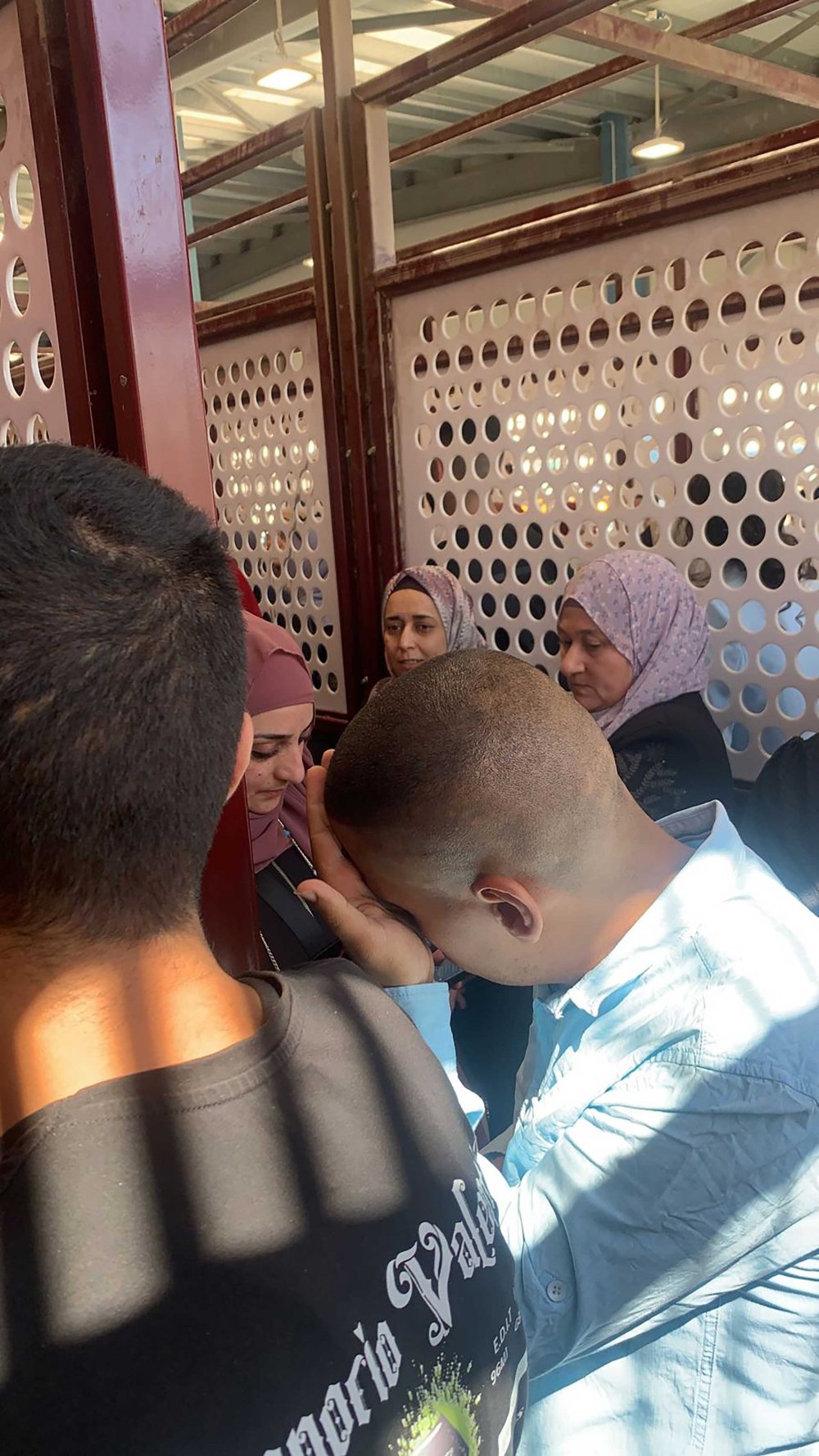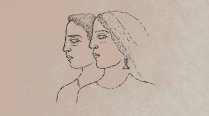Israeli Checkpoints: “A Social Geography of Horror”

Credit:
ActiveStills
Palestinian Women Share Little-Noted Hazards of Prolonged Closures: “The Checkpoints Strained My Bladder”
For over two decades, the geographies of mobility within the Israeli military structures, checkpoint regimes, and camera surveillance systems have inflicted inherent emotional, mental, and physical trauma on Palestinians. Some sociologists have described the violence against Palestinians at military checkpoints in Jerusalem, the West Bank, and the Gaza Strip as “inherently volatile sites of power and control,”1 constituting a “social geography of horror.”2
Especially grueling are the gendered dimensions of the permit system and checkpoint structures: The highly militarized power sites undoubtedly induce profound anxiety and stress, threat, danger, and humiliation; not knowing how long the wait will be or whether one will be able to make it to the desired destination in the first place creates situations of unsafety and harassment within confined entrapping spaces, especially for young women. This ultimately curtails the participation and protection of women in the public sphere, but can also arouse feelings of shame and intimidation,3 aspects that women rarely share.
Considering the larger context, particularly since Israel declared war on Gaza on October 7, 2023, many Palestinian Jerusalemites say they feel guilty or embarrassed to complain about the issues they endure while traversing the checkpoints. They know that their discomfort is minor when compared to the atrocities experienced by Palestinians in Gaza. However, their experiences are in no way normal.
Since the war was declared, Israel has maintained various degrees of closure on Palestinian spaces in East Jerusalem and the rest of the West Bank. At first, the Qalandiya checkpoint, which controls all Palestinian access to Jerusalem from the northern West Bank and normally handles over 25,000 Palestinians daily,4 was hermetically closed, as were the other two checkpoints controlling Palestinian access from the east (al-Zaytun) and the south (Checkpoint 300). No Palestinian could pass them, even Palestinians holding Israeli permanent-resident IDs. Some weeks into the war, the checkpoint was opened for only for yellow-plated vehicles, not pedestrians. Then it was opened for pedestrians but only for two hours in the morning and two hours in the late afternoon. These closures created huge traffic jams resulting in waits of five hours or more for Palestinians who need to pass through Qalandiya during the war, even just to go to school daily, as is the case for the tens of thousands of Palestinians who live in neighborhoods behind the wall.
“The Checkpoints Strained My Bladder”
In an informal group meeting over brunch in Jerusalem on November 19, 2023, Lulu says that she doesn’t drink coffee anymore.5
“The checkpoints strained my bladder,”6 she casually mentions. Lulu is a celebrated professor who taught in Bethlehem and Ramallah for over 15 years, mostly using public transport to pass the checkpoints (namely, Qalandiya Terminal to Ramallah and Checkpoint 300 to Bethlehem) by foot, which she found faster than traveling by private car. But at the end of 2019, she stopped working altogether, no longer able to endure dealing with the military checkpoints.
“All those hours of waiting and holding it for so long gave me a urinary tract infection,” she discloses when asked to elaborate. “It messed up my bladder.” Lulu does not say this in a self-pitying way but rather matter-of-factly. “It makes me laugh when I hear people claim the right to live freely when we Palestinians don’t even have the right to pee.”
As the friends chat, it becomes apparent that everyone has stories of long waits at checkpoints between Jerusalem and the West Bank. Mia, a sociologist who teaches in Ramallah, recalls one specific incident: “I remember that one time I cried at the checkpoint. I had to go so bad that I found myself pushing through the people around me. I begged, really begged, the Israeli female soldier to let me through. ‘I need to pee!’ I exclaimed to her in English with tears in my eyes. ‘Okay,’ she said slowly, as if we had all the time in the world. She walked me to the tiny toilet at Qalandiya Terminal and waited. She made me keep the door open. You wouldn’t believe how quickly I unzipped those pants. I had the greatest sense of relief. There was no way I could sustain myself for the next two hours of waiting that followed.”
“See, you never know how long the road might take,” notes Fufu, a business accountant. “You might get lucky, or not—you never really know. These days it’s impossible anyway, since the Israelis blocked all the roads and checkpoints. And if I’m gonna be honest,” she adds, “I get too disgusted from being around masses of people crammed in tiny spaces—let alone public toilets! I can’t imagine taking my mother through those borders; she has diabetes.”
“You guys are too polite,” shares Mina, a lawyer from Jerusalem. “I was waiting in the car one time at Qalandiya checkpoint, and there was madness on the road: We were stuck for hours as there was a confrontation between Palestinian kids and the Israeli army. The Israeli soldiers started shooting, and then they just shut down the checkpoint altogether. Meanwhile, I was stuck. There was no way for me to go forward or backward. After hours of waiting with extreme agitation and high anxiety, nature called. Unlike you girls, I just went for it: I got out of the car and peed on the side of the road. Thinking back, I realize I’m crazier than the average person. I would never dare do that nowadays. If I did that now [November 2023], there is no question I would get shot—possibly with my pants down!”
“You’d be considered both a terrorist and a martyr,” laughs Tamira, who is from Ramallah but holds a special work permit that allows her to work in an international organization in Jerusalem. “One hundred percent—they would shoot you right then and there in cold blood. I almost got shot this week, because I wasn’t sure which way to walk,” she adds. “The soldiers were having a tantrum—wondering what the hell I was up to. But I simply wasn’t sure! I raised my hands up and said, ‘I’m lost!’ I often think about that moment when I almost got shot dead.”
The “Image” of Civilization
In the 1990s and particularly after the Second Intifada (2000), the architecture and design of the checkpoints underwent great transformation: Starting with cement blocks and sandbags, the checkpoints have been transformed into normalized, official, airport-looking “terminals” (see Jerusalem: A Closed City).7
MachsomWatch (Checkpoint Watch), an Israeli NGO that fields groups of Israeli women who monitor and document the conduct of Israeli soldiers and policemen at checkpoints in the occupied West Bank, has been assessing military checkpoints since 2001. They have frequently reported that although Israel tries to maintain a “civilized” image of those access points, the monitors commonly report on horrendous and dehumanizing conditions. On the subject of hygiene and public bathrooms at Qalandiya checkpoint, they reported in 2019 that “the toilets are filthy and dirt and trash are everywhere.”8 In a follow-up visit in August 2020, they noted that although the Israelis erected a new and better-looking building, the overall situation is still dehumanizing. The toilets are often locked: “The door of the toilet itself was locked and all the space around it inside the shed was piled with dirt and excreta.”9
The adult bladder can hold two cups of urine; the smaller bladder of a toddler, only about two ounces. Prolonged delay to urination can cause pain or discomfort and can also increase the risk of infection (especially in women who are pregnant), kidney stones, or kidney disease, particularly if someone has certain underlying conditions, such as preexisting kidney disorders. Ultimately repeatedly holding back urine can stretch the bladder and impair its ability to contract normally, affecting ability to urinate at all times.
Women’s Issues: Gendered Perspectives
Clearly, the military structures of violence present physical and logistic challenges, often impeding access to medical care, education, work, and overall movement. Among other things, the United Nations and other organizations have documented tens of Palestinian pregnant women giving birth at Israeli checkpoints. Sometimes the babies die.10
The indignities related to personal care, hygiene, and mental and physical healthcare endured at checkpoints have been resurfacing lately, particularly in light of the war on Gaza that Israel launched on October 7, 2023. For example, in Gaza there have been excruciating cases of women enduring C-sections without anesthesia.11 Meanwhile, many women in Gaza have resorted to taking menstruation-delaying pills due to the lack of sanitary pads, access to water, and privacy.12 Having to deal with these most intimate private concerns while homeless in the middle of the chaos of war (in Gaza) and under generally brutal military domination (for Palestinian Jerusalemites) vastly compounds the indignity of an already unbearable situation.
Can’t Get Used to It
“I guess we got used to ignoring the impact of the Israeli occupation on our mental and physical health,” shares Tamira. “Much like they made us get used to seeing dead bodies in trash bags in Gaza . . .”
“Not me,” Mia interrupts. “Every single day I wake up and I’m shocked that there is a wall, and it has been there for over 20 years! A Separation Wall! I’m absolutely shattered every morning at the thought that they erected militarized walls that cut through houses, split neighborhoods in half, and made it impossible for people to access their local grocery markets—not to mention going to school, medical appointments, jobs, or just out on a date! I’m shocked that we can’t go out on a walk, let alone a run, due to the walls and checkpoints. I’m shocked that the death tolls in Gaza are being aired on global news and we are watching them without being able to even imagine what life in Gaza even means. I’m shocked that our friends in Ramallah and Bethlehem can’t join us for this cup of coffee . . . And that our friend here can no longer enjoy a cup of coffee because the checkpoints strained her bladder.”
Notes
Rema Hammami, “Destabilizing Mastery and the Machine Palestinian Agency and Gendered Embodiment at Israeli Military Checkpoints,” Current Anthropology 60, Supplement 19 (February 2019): S87.
Nadera Shalhoub-Kevorkian, “The Politics of Birth and the Intimacies of Violence against Palestinian Women in Occupied East Jerusalem,” British Journal of Criminology 55, no. 6 (2015): 1187–1206.
Mark Griffiths and Jemima Repo, “Women and Checkpoints in Palestine,” Security Dialogue 52, no. 3 (2021): 249–65.
Harrison Jacobs, “I Took the Excruciating 10-Mile Journey through Israel’s Most Notorious Military Checkpoint That Adds Hours to the Daily Commute for 26,000 Palestinians,” Business Insider, August 7, 2018.
Identifying information for all individuals in this Blog Post has been changed.
All interviews for this article were conducted anonymously by the Jerusalem Story Team on November 19, 2023.
Alexandra Rijke, “Present Checkpoint Futures: The Relaunch of Checkpoint 300 in Bethlehem in the Occupied Palestinian Territories,” Geografiska Annaler: Series B, Human Geography 103, no. 4 (2021): 337–51.
“The Issue of Palestinian Pregnant Women Giving Birth at Israeli Checkpoints,” United Nations, August 31, 2005.
Nidal Al-Mughrabi, “In Gaza, Hospital Procedures without Anesthetics Prompted Screams, Prayers,” Reuters, November 10, 2023.
Linah Alsaafin and Ruwaida Amer, “No Privacy, No Water: Gaza Women Use Period-Delaying Pills amid Israel War,” Al Jazeera, October 31, 2023.




